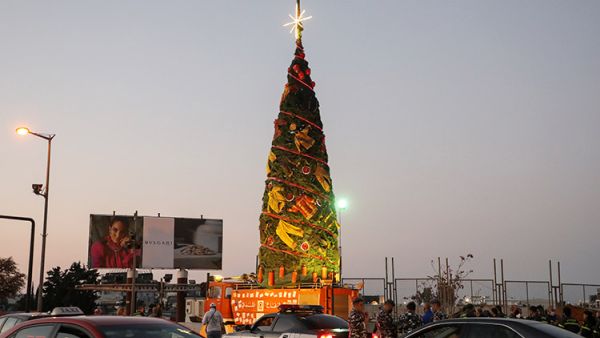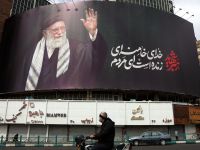The people of Lebanon are keen not to break the tradition of celebrating Christmas despite a catastrophic year that plunged them into poverty and grief.
The glamorous Christmas decorations that once transformed the streets, shops and the facades of the buildings into a magical scene during the holiday season have scarcely appeared.
While many families have no heart to celebrate, others decorated their homes with their old Christmas trees and flickering lights in a shy attempt to dismiss an overwhelming feeling of sadness in the country.
"We just don't want to break the tradition," Elias Mitri, a 30-year-old graphic designer, said while having a drink with friends at the Internazionale pub in Beirut's Mar Mikhael area, which was devastated by the Aug. 4 explosion at the nearby Beirut port.
RELATED Lebanon's brain drain: Doctors, nurses, engineers leaving amid crisis
Like in the past years, the Mitris will organize a Christmas dinner that will be attended by all the members of their extended family, who a day before will undergo COVID-19 tests as a precaution.
"We want to break the sadness...at least we can try, otherwise it will break us more," Mitri told UPI.
'Another normal day'
RELATED NGOs, international aid support Lebanon, press for reform
Painful memories of the port explosion that killed more than 200 people and destroyed some 200,000 homes are still vivid. The acute economic crisis and skyrocketing inflation are making things even worse, leaving no room for celebration for many.
Ghada Aoun, a 46-year-old mother of three, is planning nothing for Christmas.
"It will be another normal day. I can't afford to buy anything for my kids, no toys, new clothes or even a Christmas dinner as we used to do," Aoun told UPI.
RELATED Lebanon PM Hassan Diab, 3 others charged in deadly Beirut explosion
Her husband's monthly salary of 1.2 million Lebanese pounds (or $140 at the black market rate of 8,500 LL per U.S. dollar) is barely enough to cover necessities.
To survive, she stopped paying their apartment's rent and cancelled the satellite TV subscription, while restricted spending to food, school fees and, most importantly, securing an Internet connection so that her children continue their education online.
"If I want to prepare a Christmas dinner, it means that we won't be able to eat the whole month," Aoun told UPI.
Charities help
In the absence of any government support, charities stepped in to lift the grim mood and assist those most affected.
Beit el Baraka has been helping families in deep financial distress since it established a free supermarket in February 2019, securing food for some 226,000 people in need. It has also offered medical and education support and rehabilitated 3,011 homes and 250 small shops destroyed by the port explosion.
For Christmas, Maya Ibrahimchah, founder and president of Beit el Baraka, said her charity decided to bring some life to the devastated, predominantly Christian neighborhood, decorating the streets and alleys with lights while a choir quietly sang Christmas carols.
"We are trying as much as possible to celebrate but with decency and dignity because many have lost their loved ones," Ibrahimchah told UPI.
This article has been adapted from its original source.








